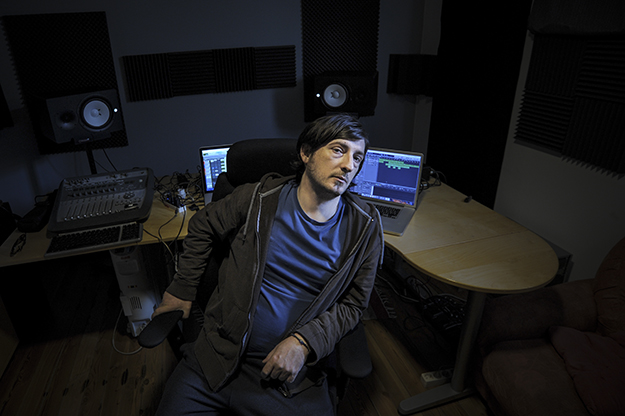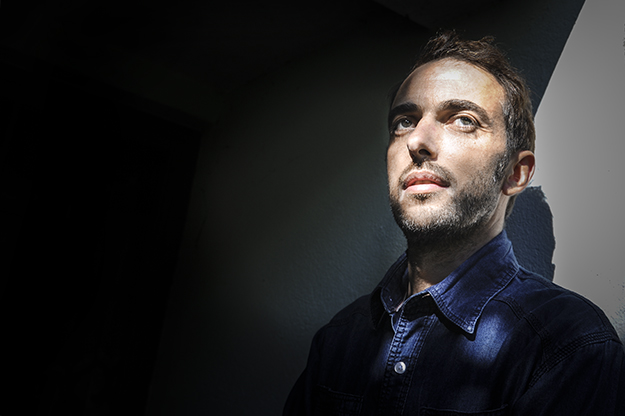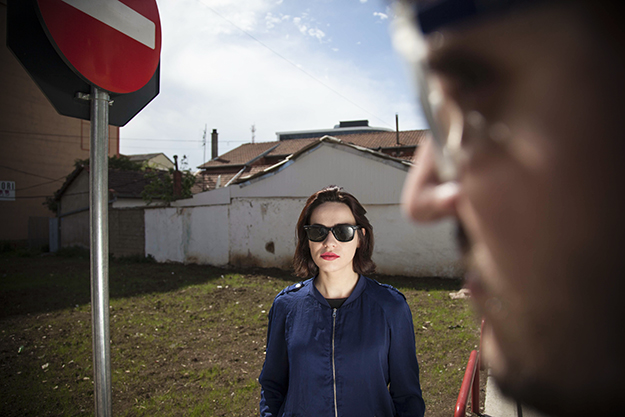It was around 10 o’clock in the morning when Jehone Ferati, or DJ Jehone to her fans, finished her set, which had started at around 1 am. This year she has not appeared so frequently onstage as she is taking a break from her decks, which is why this set at Prishtina’s Bahnhof club “came from the heart” and extended so long into the morning. Jehone’s crowd was appreciative, and even continued clubbing for another hour before Bahnhof finally closed.
The small club can accommodate more than 100 sardine-packed bodies, and has a quiet front porch used mostly for a breath of fresh air, chatter and drinks. More often than not, you can meet some wandering foreigners, including Berliners. But as J.R.R. Tolkien wrote, “not all those who wander are lost,” and these youngsters have come specifically to experience Prishtina’s clubbing scene, which has been developing over the last 17 years.
The scene really took hold in the often mythologized times of late ’99 and the early noughties. To try and capture the feeling of that seminal era and discuss the changes in the Prishtina clubbing scene, K2.0 met with some key figures from those post-war parties, the DJs, the club owners and the partygoers.

Driton Pllana, better known as Toton was a metal fan in the late ’90s, but slowly drifted towards electronic music and helped form Prishtina’s clubbing scene from the DJ booth. Photo: Atdhe Mulla / K2.0.
The early days
Everyone knows Driton Pllana as Toton, the long haired techno DJ “hitting the decks” with a lowered gaze and a tilted head to keep his headphones in place. Yet few know that his first musical love was metal. “Me and my friends were interested in electronic music, and in the bands that mixed rock and roll with electronic music,” recalls Toton in his small darkened studio, where the light came from a small window and his two laptops. “But the ego of metal did not allow me to get into it fully.”
Toton used to go to techno parties, and although he enjoyed them, he couldn’t commit the sin of switching allegiances. It was The Prodigy that finally had the power of conversion. “When the Prodigy happened it was like ‘good night!’ Things changed,” he says, demonstrating the metamorphosis through short, sharp hand movements.
Recalling the early parties in Prishtina, Toton describes the scene as new, and undefined. “The people were unspoiled, they wanted to listen to something new, to enjoy themselves,” he enthusiastically explains. “Everyone was exploring through techno,” he continues, leaning back in his chair before adding: “After all, techno is all about exploring.”
In the early days, what Toton and his fellow DJs were exploring was their own and their audience’s tastes. “I think that that generation of DJs, like Dardan, Naka, Goja, Uki, myself, Vegim, Legoff… We were enjoying the moment,” he says. “At the beginning the scene was like that, people didn’t know what they wanted, but that made it way more interesting.”
Toton admits that there was an amateurism to the DJing and that no one knew exactly what they were doing. But back then, they didn’t have time to care. A camaraderie was in the air, and a new scene was popping up. Life after midnight had begun in Prishtina.
In this new world, clubs and cafe bars were sprouting up like mushrooms, including ‘Underclub,’ which was also known as ‘The Three Monkeys.’ Toton identifies this as the club that birthed Prishtina’s techno scene, and describes its clientele as “people who lived from one Friday to the next.”
But the parties were not confined solely to clubs in Prishtina. Toton remembers one party held in the middle of winter in Mitrovica. “It was in a hall that had broken windows. Lots of people from Prishtina went,” he recalls. Despite the cold, the party continued deep into the night, causing many partygoers to be ill the next week. “People were really determined,” he says.

Dardan Ramabaja made his DJing debut alongside Toton after the two were left disgusted by a commercial dance music night at the Red Hall in Prishtina. Photo: Atdhe Mulla / K2.0.
A fellow combatant in the fight against the deafening noise of generators, and the horrors of mainstream music was Dardan Ramabaja, a guitarist, and a member of the band “KEK.” Just like Toton, Dardan was more into punk and metal in the late ’90s, but was also swept away by the Prodigy. “They were a sort of bridge between genres,” he says. “Even their lyrics were punk.”
The two DJs were close comrades, and their careers both launched on the same night. “I can never forget when after the war, someone hosted a party in the Red Hall and had booked some DJs,” Dardan recalls. “The music there was so commercial and miserable. A group of us decided to leave for somewhere else, and headed towards a club simply knows as Te Majmuni.” Dardan and Toton had managed to get hold of some CD players. They contacted the owner, who opened the doors of the club, and the two DJs played their first ever set.
Tracking down equipment for DJing often became a labor of love. Dardan tells one story of the extent he went to track down some decks. “Somebody told me that Beka, the rapper Beka had some turntables, so we went to his place at 11 o’clock at night,” he says. “We went to the 13th floor, on foot because the elevator was not working, but we got them.”
Children of the dance
When Megaherc opened in 2000, it was the first venue that existed exclusively for house and techno. It was co-owned by another luminary of Prishtina’s early clubbing scene, Bersant Rizaj, who became passionate about electronic music as a teenager and has built up a collection of thousands of CDs and records. “From passion it turned to business, and then into an industry,” explains Rizaj.
Megaherc started bringing DJs from Croatia and Macedonia to Prishtina, before moving to a new location as Radio. It was at Radio that, according to Rizaj, the first internationally renowned DJ was brought to Kosovo, Nicky Holloway.
Outside influences were already creeping in on the newly found techno scene. Vinyl was brought back from friends abroad, while Dardan identifies two British godfathers of house, Eddie Richards and Dave Mothersole, as regular visitors to Kosovo who had a huge impact on the Prishtina scene.
Other international guests followed at Radio before Rizaj opened a new club, which Toton describes as legendary, and Jehone blames for her introduction to techno: Spray. There, the number of visiting international DJs exploded. “We brought 210 DJs in 10 years,” Rizaj recalls proudly.
Spray had a strict door policy to ensure the right crowd filled its dance floor, although in truth, it was more of an aspiration than a reality. “All good places are profiled,” says Rizaj. “You and I cannot go to a Hell’s Angels bar, where everyone is covered in tattoos and rides Harleys. We would not know how to behave, because we do not belong there.” The club also refused to pander to materialism or extravagance. There were no fireworks or sparklers when ordering champagne at Spray. “Nowadays,” Rizaj laments. “If you leave enough money in the clubs you can even get in the DJ booth.”
Spray was about dancing, house and techno, inspired by a subculture that was spreading around the world. “The music, the way it makes you feel good, the friendliness of the crowd, that gave us something new,” Rizaj says, justifying his love of techno and that subculture. “Being in a group with hundreds of other people that all feel the same thing is an indescribable feeling.”
Spray was in the back of a two storey building, with only the second floor utilized, a single open venue divided into around four areas through its architecture. The DJ booth was behind a half arch, in front of which were its faithful partygoers, of all ages.

DJ Jehone fell in love with electronic music at Spray, before embarking on her own DJ career that has seen her take up as a resident at one of Europe’s best known underground venues. Photo: Majlinda Hoxha / K2.0.
One of those young clubbers at Spray was DJ Jehone, who was inspired by the team of local DJs as well as the many international guests on the decks. “I grew up when the electronic music scene in Prishtina was very good,” she says. “Naka, Toton, Lika, Gent, Goja, Uki, all that old generation [of DJs] was my inspiration to start listening to this music.” The DJ pauses to recall something, before continuing as if a realization had suddenly dawned. “Spray is the culprit,” she says laughing.
Although she had a career in television as a presenter and a journalist, at one point of her life she sought more independence, quit TV, and turned to DJing. A year into her career, Jehone has appeared at clubs across Europe, including a spell as a resident DJ at the Nordstern club in Basel, where she appeared alongside some of house and techno’s biggest names, including Solomun.
Over the years she has grown a lot as a DJ. At the start of her career, she used to like the ovations she received from the public whenever a track “dropped,” but her outlook has changed. “Nowadays I am way more satisfied when I see that people have their eyes closed and are not even thinking about who is playing music. When you are leading them on with a vibe, and they follow you all night.”
It’s a development that she believes came mostly from playing abroad. “In Prishtina, the crowd mostly waits for the drop,” Jehone says. She hopes that she can spread her ideals of weaving a story through a set, back to Kosovo. “I like to believe that, just as I was young one day and getting inspired by Toton, Goja, Naka, and other DJs, that I am inspiring the next generation.”
Growth or mutation?
Prishtina’s party scene has experienced highs and lows over the years, and while there are currently more DJs spinning house and techno than ever before, the original partygoers and founders of the scene feel something has got lost in recent years.
Jehone believes that the party scene in Kosovo has regressed since the halcyon days of Spray. “Sometimes I feel that we do drugs more than anyone in Europe and yet we do not have any fun,” she says, adding with clear discomfort her next sentence: “Ninety percent of people do not go out to listen to the music. They go out to vent the frustration they have, and go out with negative energy, or just simply to take the drugs that they have, and tomorrow get depressed again.”
Both Jehone and Rizaj also believe that clubs’ booking policies have changed, with prestigious international guests often becoming more of an irritation than an inspiration. Jehone tells of times when she and her fellow DJs were offended by night clubs because, as she puts it, “we all played better music than that guy who came with a laptop and received 10 or 20,000 euros.” Rizaj has a similar feeling, explaining that at Spray, “we had to research a lot to find someone suitable in price and in sound.” He feels that today promoters are just obsessed with big names.
He adds that clubs are now forced to put on more commercial nights in order to survive financially. He gives the example of Zone, which puts on a wide range of music. “Someone that had had fun at [tallava singer] Ermal Fejzullahu one night, comes again when Ricardo Villalobos is playing because he does not know [who is playing that night],” says Rizaj. “He just wants to go to the club where he had fun the other day.” Rizaj expresses sympathy for the generation growing up in these circumstances, who he feels “every day have less and less knowledge of what techno and clubbing really are.”
Even in more dedicated techno clubs, Rizaj is confused by the modern crowd’s reactions, explaining with passion that what he sees truly confounds him. “It’s like it’s the middle of the day! They are in deep conversations at three o’clock at night! I don’t see people dancing, smiling, or enjoying themselves anymore.”
Toton believes the more serious attitudes come from the huge rise in the number of DJs in the Prishtina scene. “Today, out of 200 people, 100 are DJs,” he claims, with a heavy dose of sarcasm. “There are too many analysts, and whereas once people were more innocent and went to clubs to dance, today they have forgotten what fun is.”
Nevertheless Toton still has high hopes for this huge new wave of people involved in the techno scene, speaking excitedly about the number of new blogs set up, and the sets that litter SoundCloud and Facebook. He believes there is a wealth of talent, but that the unity and values are sometimes missing. “I did not get into this business to be famous, but because it was fun and still is,” he says. “I think that the new generation of DJs have big egos, and think they know everything. But I don’t know everything and even my professor who was a producer for Bjork does not know everything.”
Toton rarely picks up his headphones now because, as he puts it, “I’m 40, I have a production studio, a family, and two cats,” though the earplugs that litter his studio may also reveal another story. Still he cares deeply about the Prishtina clubbing scene: “We need less ego, less hate, more respect and greater unity,” he states.
Jehone meanwhile feels that the Prishtina’s clubbers would benefit from an easier escape out of the goldfish bowl. “When you are in Prishtina all the time, it becomes hard to reflect upon the techno scene here,” she says. “But when you get out you start to feel sympathetic towards others left behind, and you want to share something with them.”
While travel has been key to Jehone’s development, she believes that Kosovo’s new wave of DJs should not try to emulate foreign styles. “We do not need to be Americans, or Germans or anything. We need to be original, natives in the things we do,” she argues. “Not to only try and achieve success, but to do it from your heart. Then success is guaranteed.”K
Feature image: Atdhe Mulla / K2.0.




